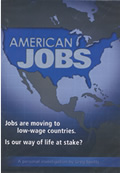Other
Morrison
Articles:
Taking Your Land For Private Developers
THE BREADBASKET OF AMERICA IS FULL OF HOLES
Joyce
Morrison
February 25, 2006
NewsWithViews.com
Food producers in America are finding as many holes in their effort to produce food as attorney Harry Whittington has from Vice President Dick Cheney�s buckshot. At what point could a hole in the heart of America�s food supply prove to be fatal?
South Dakota�s Secretary of Agriculture, Larry Gabriel said �some people think the farm subsidy program is the goose that lays golden eggs for farmers. I certainly won�t dispute that Congress knows how to lay an egg, and sometimes they are golden, but the gold is not going into the pocket of farmers.�
People in America appear apathetic about the origin of the food they take for granted. However, foreign countries see problems with America�s agriculture system and a report from New Zealand stated, �Rising energy costs and interest rates are gobbling up the bottom line for farmers, analysts said.�
The report continued with a quote from Illinois grain farmer Brian Sharp who said, �farmers are worried about President Bush�s new budget plan would shave payments to farmers by 5% and lower the cap on payments.�
A full, satisfied stomach would see no problem with the �free loading farmers getting a cut on their payments.� These comments are comparable to complaining about your inside bathroom only to find you have to exchange it for an outside one. Until America is hungry, apparently they will remain unable to see the situation as it exists.
Grain farmers in the breadbasket were given a gaping hole recently when they learned the 2007 budget did not contain funding for the repair and updating of the Upper Mississippi and Illinois River systems. President Bush is quoted as saying, �existing locks can continue to process tows safely and reliably for the next 50 years or more, as long as we continue to invest prudently in their maintenance and rehabilitations.�
The millions of people who depend upon the rivers for commerce wonder �what dimwit gave the president this misleading information?� If we started today, it would take years to complete the update. Each year updates are stalled increases the cost. Even if the locks were not old and often causing serious problems, they are far too small to lock through the modern long barge tows causing hours of delay while farmers are trying to compete in a fast moving, global market.
Imagine the cost of putting 58 more semi-trailers on the highways to replace a singe barge (a tow consists of 15 barges). A barge can travel 514 miles per ton on a gallon of fuel. Compare this to the 50 miles per ton a semi-trailer can carry. Barges emit almost half the emissions a truck does per gallon of fuel consumed. Can our highways support this increase in truck traffic and pollution?
Where are the environmentalists on this one? They are doing everything possible to remove traffic of any kind, except possibly a canoe, from the rivers.
Hurricane Katrina caused a major transportation problem at the Gulf ports and barges were backed up for weeks during last year�s harvest season. Farmers and elevators scrambled for storage but those who had to sell directly from the field virtually gave their grain away�.and they could not afford that hit. Regardless of media reports, farmers are hurting from the prices paid for their 2005 crop.
United States farmers and other industries that depend upon barging their products are struggling to keep a navigable inland waterway open. At the same time, grain producers from South America, who compete with American farmers for the foreign market, have vastly improved their waterways.
Input costs have risen dramatically. If you think it costs to fuel your car, try paying the fuel bill for tractors, combines and trucks. Fertilizer is a by-product of petroleum and prices have skyrocketed while at the same time, prices received for grain are at rock bottom.
Local schools and local governments are in the �spend, spend, spend� mode causing property taxes to soar. In rural communities, where there are virtually no large business or commercial entities to tax, farmers are picking up a large part of the tab. This is tearing another big hole in the rural economy.
An excerpt from the Chicago Tribune should bring serious thoughts to those who like to eat.
Fresh Del Monte Produce, a company whose brand has been synonymous with Hawaii for 90 years, announced this month it would plant its last crop here on Feb. 19 because it now is cheaper to import pineapples from foreign countries. The company's 700 employees will need to find new jobs.�
Agricultural industries everywhere in the United States--from the vegetable fields of California to the dairy farms of Vermont, from the cornfields of Illinois to the orange groves of Florida--have in recent years faced increasing competition from foreign markets. But in few places are the stakes so high as Hawaii, where shifts in the agricultural balance can affect the tourism economy, the availability of food on an archipelago so dependent on imports that it has less than a week's supply at any given time, and the ratio of rural to urban land on islands many believe already are overdeveloped and overcrowded.
When the United States becomes as dependent on foreign imports for food as we have oil, how many weeks of supply will we have if our imports are cut off?
Will renewable fuels be the answer? It takes energy to make energy and while ethanol and bio-diesel are good for the farmer, what fuel will be used for the processing of ethanol? The environmentalists have refused to let ANWR be opened to drilling for oil and they do everything they can to prevent the EPA from issuing permits for new power generating plants. Environmentalists appeal permits and fight against the use of coal so what are we to use to generate energy?
The push for the enforcement of the National Animal Identification Act (NAIS) by big agri-business will put a lot of small livestock producers out of business. If a tag or chip is forced to be used to track every chicken, duck, hog, or cow that you have at your home (premise), the expense and time will be so prohibitive that the small producer will be forced out of business. This leaves our meat to come from foreign countries or large mega-producers.
Small producers are known to produce the highest quality food product. Profit drives the large agri-business industry while heart drives the family farmer. A small producer can�t afford to make mistakes. Large producers stimulate growth for faster weight gain of their animals by the use of hormones. Small producers raise their animals using very few �extra� inputs. Financially they cannot afford to make mistakes, as the loss of one animal eats a major hole in their profit.
Chipping and tracking farm animals has absolutely nothing to do with preventing disease. Will we be chipping birds and wild animals because they carry disease? However, it conveniently provides the government with the data-based information on every food animal in the entire nation at the expense of the farmer.
Will we be turning to cloned animals for production? From the UK we are told, �The US agricultural industry has observed a moratorium on using the products of clones since 2001, but it has recently become clear that a few offspring of cloned pigs and cows are trickling into the American food supply because the moratorium is only voluntary.�
|
Subscribe to the NewsWithViews Daily News Alerts! |
Land controls eat a big hole in agriculture. Control of watersheds will soon place severe restrictions on land use. The Endangered Species Act can shut down a farming operation. Viewsheds can dictate how private property can be used. The list of invasive, controlling programs is endless.
From
every direction new holes keep tearing away at our food production
and until tummies get hungry and the �powers that be� wake up -- and
soon -- America will no longer have the safest, most economical food
supply in the world because the family farmer will be out of business.
� 2006 Joyce Morrison
- All Rights Reserved
Joyce Morrison is a weekly columnist and news reporter for the Illinoisleader.com, an online conservative news source. She also writes for SOWER magazine, NewsWithViews.com, as well as various other publications. She is a weekly participant on the teleconference of the Illinois Policy Institute, a conservative think tank and is a pro-life, pro-family activist.
Morrison attempts to educate the public regarding the dangers coming to their local communities through Sustainable Development and Agenda 21 programs which are designed to gradually take control of all private property through undue regulations.
She is a chapter leader for Concerned Women for America as well as Secretary to the Board of Directors of Rural Restoration/ADOPT Mission, a national farm ministry located in Sikeston, MO. FarmersRuralRestoration.com. Her most enjoyable time is spent teaching a senior adult Sunday School class which is a focus on hope and encouragement.
E-Mail: dayspring365@yahoo.com
Small producers are known to produce the highest quality food product. Profit drives the large agri-business industry while heart drives the family farmer.












